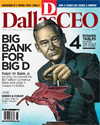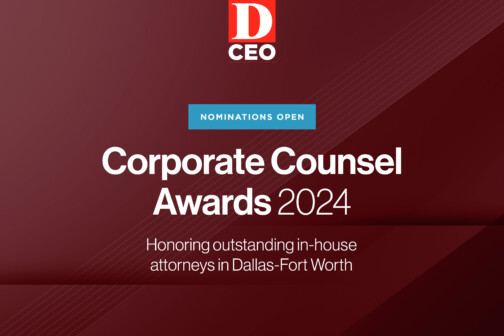 |
| BREAST ENHANCEMENT: Former president of Church’s Chicken Hala Moddelmog now heads the second-largest funder of breast cancer research. photography by Elizabeth Lavin |
Have you ever heard anyone say, “at least we don’t have to cure cancer”? Well, what if your job was to cure cancer? And you’re the new CEO of an iconic non-profit organization?
In February, “World Business” carried an article from The McKinsey Quarterly (online) entitled, “The CEO’s role in Managing Change.” The first line began, “Undergoing change is invariably a difficult experience.” A new CEO always means some change, but when the CEO is brought in to an organization viewed as highly successful, there are more potential potholes to fall into than a New York City street. That’s what faced Hala Moddelmog, the new CEO of Susan G. Komen for the Cure (formerly the Susan G. Komen Breast Cancer Foundation), which started in founder Nancy Brinker’s living room and has grown to 125 affiliates and more than 100,000 survivors and activists.
Moddelmog did not come from a non-profit background. She was the first woman to head an international “quick service” brand restaurant when she was named president of Church’s Chicken in 1995. Although Komen for the Cure is viewed as a model for other advocacy groups, the board felt it was time to recognize that Komen, the second-largest funder of breast cancer research after the Federal government, had to take a big step forward to achieve a “world without breast cancer.”
Moddelmog had the benefit of being introduced by Nancy Brinker who said, “We’ve challenged her to take a look at the way we do business. We’ve told her to bring her experience and skills to sharpen our edge.” That positioned her as the driver of change.
What should a new CEO do first? “Listen,” she says. “Listening is absolutely critical. On my very first day, I told people I was going to listen and learn for 60 days.” She says a new CEO should talk to as many people as possible. “I listened at headquarters, to staff at our affiliates, to our volunteers, our board, to survivors.” (Moddelmog is herself a breast cancer survivor.) She attended symposia and conferences to meet Komen grantees and hear firsthand from researchers and clinicians about advances leading to a cure.
| ›› THE TAKEAWAY |
| 1. New CEOs shouldn’t talk. 2. If “change” means “firing,” be compassionate and fair. 3. Workers are more willing to adapt when they know the bigger picture. |
One of the pieces of advice from Carolyn Aiken and Scott Keller in the McKinsey Quarterly piece is, “Build a strong and committed top team.” In an influential article, “Leading from Below,” authors James Kelly and Scott Nadler write, “In an age when job cuts are common at even the most successful companies, being a good manager who doesn’t make waves is increasingly risky.” In an established organization, that means assessing the individuals in place. A number of the Komen staff had been there almost from the beginning.
After 60 days of keeping her ears on and lips buttoned, Moddelmog moved quickly. Executive changes are a way of life for most companies and organizations, but this was a “first” for Komen. Moddelmog knew it could be shocking if not handled properly. She insisted that when change touched individuals, Moddelmog would be the one to tell them—directly and personally. A CEO needs to assure the entire organization that the process will be as compassionate and fair as possible. “People who are asked to leave need to be treated with utmost respect and care. This is a mission-driven organization. Even if their skill set isn’t right for our next steps, they put their heart and soul into the organization. They have contributed,” she says.
Kelly and Nadler write, “CEOs can’t change companies on their own. The secret is to foster a leadership mentality throughout the ranks.” Moddelmog says she “tries to create an environment where people feel it’s safe to take risks and do things differently.” And she says talk is cheap; people are watching to see what your first reaction is. “I asked if we were doing enough for the activists, and the next thing I knew, people were in my office. They had been wanting to do short video vignettes for a long time. I said, ‘Yes,’ and six weeks later, they were done and are starting to be picked up across the country.”
She says people realized that she was serious, not just about listening to new ideas but about putting them into practice quickly. While the video vignettes were a small project, she says given the scope of their future plans, “It was incredibly energizing to everyone.” They’ll need energy because Komen plans to invest another billion dollars in the next decade in breast health care and treatment. They also plan to increase their focus on underserved women and on research to discover the causes of breast cancer and ultimately its cures. Since Komen is celebrating its first quarter-century as an organization, they had a long list of projects under way that needed to be kicked into high gear, from a new brand rollout, including a re-design of their Web site, to international summits to legislative initiatives.
Kelly and Nadler have a number of recommendations for CEOs implementing change, and we ran them by Moddelmog for a reality check:
Day-to-day responsibilities can be all-consuming and distract the CEO from tackling longer term issues. “This is so true,” she says. “It would be great to just look at the big picture, but breast cancer doesn’t wait. Fundraising doesn’t wait. Outreach needs to be done. The only way to handle being pulled apart is to have a strong senior team. Because of the kind of organization we are, I get constant calls and e-mails, virtually 24/7.” Moddelmog says that such constant communication comes with being open and accessible, something she has to do if she wants others to emulate her. She says you just have to do both, get through the hour-to-hour tasks while keeping one eye on the long-term future.
Work on your trusted advisor skills. “Of course. The only way to bring about change is to be a role model,” she says. Sometimes it’s very basic advice that people need. “When people are promoted, they can focus on the wrong things, sometimes sticking with the technical skills that got them recognized. I really try to help them learn what they need to excel at for the next level.”
Expose others to information, don’t hoard it. Moddelmog says, “I agree with this, too, and we’ve vastly expanded how many people review financial information. This lets everyone understand what the challenges are. I’ve also started blast voicemails, particularly when I’m traveling. I was recently on Capitol Hill and sent everyone a voicemail to share what a warm reception I got and to let people know that’s because of the work they’ve done.”
Aim to influence existing processes, don’t build new ones. “I know what they’re getting at here,” she says. “But it’s very important to quickly identify what needs to be added or changed dramatically. For example, we’ve introduced something called a ‘balanced scorecard’ so everyone can see just how their job contributes to the overall strategy and how what they do can be measured.”
Moddelmog says sometimes it’s “building on” that’s important. Komen has turned its attention offshore and to other countries, starting with affiliates in Puerto Rico, Germany, and Italy, but this spring, she and Nancy Brinker went to the West Bank, Israel, and Jordan to announce a Middle East partnership for breast cancer detection, education, and treatment. Brinker told her it was like stepping back in time 25 years to when people in the United States wouldn’t talk about breast cancer and newspapers wouldn’t print anything. Moddelmog says the day after their conference in Amman, the local papers printed drawings on how to do breast self-examinations. “Everyone was floored,” she remembers.
Moddelmog says she has one significant advantage. McKinsey’s Aiken writes, “People will go much further for a cause they can believe in.” People certainly believe in what Komen stands for, Moddelmog says, adding, “I was blown away by the incredible enthusiasm and the level of intensity.” Of course, they do plan to cure cancer.
Merrie Spaeth is one of the pre-eminent crisis management strategists in the world. After serving as President Reagan’s director of media relations, she founded Dallas-based Spaeth Communications in 1987. She is also a lecturer at Southern Methodist University’s Cox School of Business.





